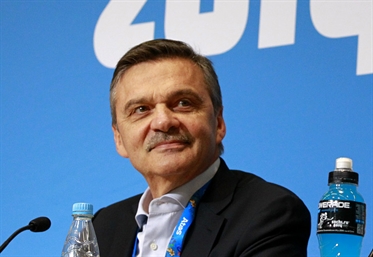“It will never happen”
“It will never happen”
Women’s hockey safe as Olympic discipline

 IIHF President Rene Fasel addresses the media during the 2014 Olympic Winter Games in Sochi. Photo: Jeff Vinnick / HHOF-IIHF Images
IIHF President Rene Fasel addresses the media during the 2014 Olympic Winter Games in Sochi. Photo: Jeff Vinnick / HHOF-IIHF Images
Women’s hockey has been in the spotlight since then-IOC President Jacques Rogge challenged the sport and criticized the lack of competitiveness in Vancouver 2010 with Canada and the United States dominating the game and having qualified for each Olympic gold medal game with the exception of Turin 2006 where Sweden eliminated the U.S. in the semi-finals.
NHL Commissioner Gary Bettman said he, speaking as a hockey person, would be distressed if the IOC were to remove women’s hockey from the Olympics.
Fasel had calming words for him and the audience. “It will never happen,” the IIHF President and IOC Executive Member said about the risk of women’s hockey losing the Olympic status.
And he has good reasons for that confidence. Sochi 2014 might prove to be the best and most competitive Olympic women’s ice hockey tournament ever since the start in Nagano 1998. The games were more intense, more entertaining to watch, the players more athletic and the number of blow-out scores has clearly gone down.
Fasel compares this progress with men’s Olympic history.
“In the ‘30s Switzerland lost to Canada in two digits in men’s hockey,” Fasel said.
It took 82 years for the Swiss to record a first victory over the Canadians, finally breaking the hoodoo in 2006 with a 2-0 win in Turin. The countries’ first encounter, back in 1924, saw a Canadian amateur club team steamroller Switzerland 33-0. Luckily men’s ice hockey wasn’t eliminated from the Olympics despite the rough start.
Continue reading“The way the women played here is much better than in Vancouver. Canada and the United States still have an advantage. We have 80,000 women playing in Canada and maybe 4,500 women playing in Finland and even less in other countries.
“We invested over 2 million Swiss Francs in the women’s hockey program since Vancouver and I hope it will be even better PyeongChang. We need some more years and patience and to work very hard but it’s getting better. The IOC is willing to give us the time. The women’s participation has not been a question,” Fasel said.
“If it’s getting better I’d like to have ten instead of eight teams [in the Olympic women’s ice hockey tournament],” Fasel added. “Maybe it’s too early for PyeongChang but maybe for 2022. The ultimate goal should be to have 12 teams.”
Back to Overview







































